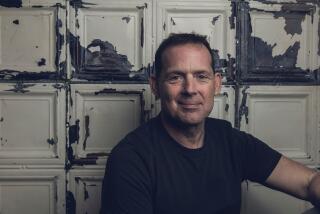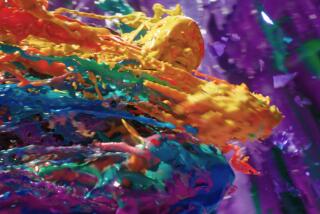HEARING IS BELIEVING ON NEW ‘TWILIGHT ZONE’
- Share via
CBS may be literally journeying to “another dimension . . . of sight and sound “ when all-new episodes of “The Twilight Zone” premiere Friday at 8 p.m.
The revived speculative-fiction series, to which CBS has owned title rights since it began airing on that network in 1959, will feature touches of “three-dimensional sound” this time around.
A bird singing in a tree on screen, in other words, should sound as if it’s higher up and perhaps farther away than the people speaking in the foreground. The sound of a trickling water fountain travels from the top corner to the opposite bottom corner of the screen as the camera pans accordingly.
The magic behind this is “spatial reverberation processing,” which re-creates sound via computer to match how the brain would perceive it in different situations. The process has served as the impetus for CBS to catch up with rival NBC’s efforts in stereo TV, since that is the format that best showcases the new effect.
“We’re going to do experimental stereo in Philadelphia for the ‘Twilight Zone’ premiere,” CBS Broadcast Group spokesman George Schweitzer said. The network until now has not had enough music or sound effect-oriented shows to warrant a rush to stereo, Schweitzer added, but does intend to gradually convert to stereo over “the next several years.”
Even viewers hearing “The Twilight Zone” on a standard TV set’s 3-inch speaker, however, will be able to pick up “really accurate positioning of sound,” said Stanford University acoustician Betsy Cohen, a consultant to the series.
“In stereo, we get all that and more,” Cohen continued. “You get left-to-right motion and you get surround. You get a great sensation of sound moving around your ears.”
Cohen, who is a consultant to CBS on its eventual move to stereo, also is paid by “The Twilight Zone” to implement the 3-D process, first developed at Northwestern University’s Computer Music Studio.
Fittingly, considering the new effect’s musical origins, Cohen was brought to executive producer Philip DeGuere’s attention by Mickey Hart, drummer with the Grateful Dead. Hart is officially the show’s sound designer and his fellow band members are co-composers of its music, along with jazz pianist Merl Saunders.
Hart, as DeGuere remembers it, got the job when he was the only one of the Dead who showed up for a meeting with DeGuere after the band expressed interest in working on the show. “His first words to me were, ‘I live in the Twilight Zone,’ ” DeGuere said.
The 3-D sound effect thus far is used sparingly, since it is processed at Northwestern and is only subtly perceived on monaural sets. But DeGuere doesn’t believe that it’s a wasted effort. In stereo videocassette form, or rebroadcast when stereo TV is more widespread, “these shows are going to have an enhanced quality that is going to make them worth a lot more money to CBS.”
Not everyone associated with the new “Twilight Zone,” however, is convinced this aural fixation will pay off.
“People in this industry are technologically mad,” said novelist Harlan Ellison, the series’ creative consultant, who routinely works at a portable typewriter on the production office’s balcony. “I work on the text of the story. That’s where (the show) begins and ends.”
Thus far, 33 “Twilight Zone” segments have been produced for the new season. They range in length from 30 seconds to 35 minutes and will be grouped in twos and threes to form 13 hourlong episodes.
Not surprisingly, given former “Whiz Kids” executive producer DeGuere’s penchant for high-tech audiovisual toys and computerized script processing, Ellison acknowledged that he, DeGuere and the other members of the creative team “have terrible fights with each other.”
Ellison also sneers at any comparison between the new “Twilight Zone” and the original Rod Serling series, the last new episodes of which were produced 20 years ago; or with NBC’s “Amazing Stories,” a half-hour fantasy-fiction show created by film maker Steven Spielberg.
“We haven’t paid any attention to them,” he said. “If Norman Mailer sits down to write a book, does he care what John Updike is doing?”
More to Read
The complete guide to home viewing
Get Screen Gab for everything about the TV shows and streaming movies everyone’s talking about.
You may occasionally receive promotional content from the Los Angeles Times.






